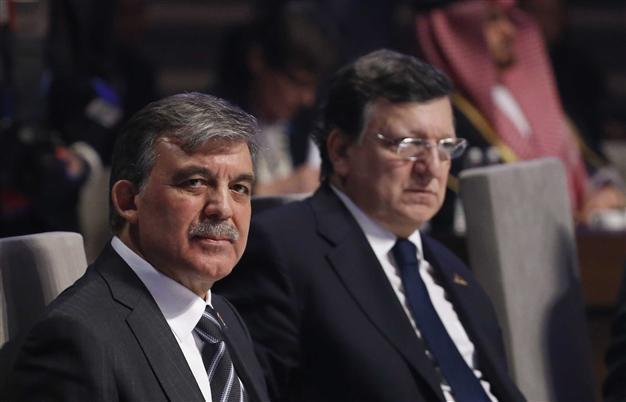Turkey to eliminate highly enriched uranium
Tolga Tanış / WASHINGTON

Turkish President Abdullah Gül (L) and European Commission president Jose Manuel Barroso attend the opening session of the Nuclear Security Summit (NSS) in The Hague on March 24, 2014. AFP PHOTO/POOL/YVES HERMAN
Turkey has released a joint statement with 11 other countries at the third Nuclear Security Summit in the Hague, marking the elimination of highly enriched uranium (HEU) from within its borders.“Noting the extensive security measures and significant financial costs associated with the possession of this material, and the technology that has been developed to fuel research reactors with low enriched uranium (LEU) fuel and to conduct the vast majority of experiments and to produce isotopes without the use of HEU, the removal of HEU from our territories has had clear and tangible benefits,” leaders of Chile, Czech Republic, Denmark, Georgia, Hungary, Mexico, Republic of Korea, Romania, Sweden, Turkey, Ukraine, and Vietnam said in the statement. President Abdullah Gül represents Turkey at the summit.
The statement expressed appreciation to the Russian Federation, the United States of America and the International Atomic Energy Agency for their assistance in converting research reactors from HEU fuel to LEU fuel and in related HEU removal efforts. 12 leaders, along with Kazakhstan and Singapore, applaud other countries that have similarly eliminated HEU and encourage all countries to support HEU minimization efforts to the greatest extent feasible, including those in a position to do so to eliminate all HEU from their territories in advance of the fourth Nuclear Security Summit to be held in 2016.
“We welcome this statement and the leadership role these nations are playing in a growing global trend away from highly enriched uranium in civilian uses,” the White House has announced.
After Turkey and Japan signed an agreement for a nuclear plant construction last year, it was speculated that Ankara could now have access to HEU which could be used in the production of nuclear weapons.
Meanwhile, U.S. President Barack Obama and Japanese Prime Minister Shinzo Abe said in a statement that Japan will turn over hundreds of kilograms of sensitive nuclear material of potential use in bombs to the United States to be downgraded and disposed of.
China had voiced concern earlier this year about Japan’s holding of plutonium but Washington and the United Nations nuclear agency in Vienna have made it clear they are not worried about the way Tokyo is handling the issue.
At the start of the summit, Italy and Belgium have also announced they had moved excess nuclear materials to the United States for disposal or downgrading under the terms of past agreements.
















